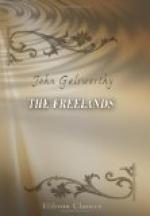“The revolt which has paralyzed the hay harvest on Sir Gerald Malloring’s Worcestershire estate and led to the introduction of strike-breakers, shows no sign of abatement. A very wanton spirit of mischief seems to be abroad in this neighborhood. No reason can be ascertained for the arson committed a short time back, nor for this further outbreak of discontent. The economic condition of the laborers on this estate is admittedly rather above than below the average.”
And at once she thought: ‘"Mischief!” What a shame!’ Were people, then, to know nothing of the real cause of the revolt—nothing of the Tryst eviction, the threatened eviction of the Gaunts? Were they not to know that it was on principle, and to protest against that sort of petty tyranny to the laborers all over the country, that this rebellion had been started? For liberty! only simple liberty not to be treated as though they had no minds or souls of their own—weren’t the public to know that? If they were allowed to think that it was all wanton mischief—that Derek was just a mischief-maker—it would be dreadful! Some one must write and make this known? Her father? But Dad might think it too personal—his own relations! Mr. Cuthcott! Into whose household Wilmet Gaunt had gone. Ah! Mr. Cuthcott who had told her that he was always at her service! Why not? And the thought that she might really do something at last to help made her tingle all over. If she borrowed Sheila’s bicycle she could catch the nine-o’clock train to London, see him herself, make him do something, perhaps even bring him back with her! She examined her purse. Yes, she had money. She would say nothing, here, because, of course, he might refuse! At the back of her mind was the idea that, if a real newspaper took the part of the laborers, Derek’s position would no longer be so dangerous; he would be, as it were, legally recognized, and that, in itself, would make him more careful and responsible. Whence she got this belief in the legalizing power of the press it is difficult to say, unless that, reading newspapers but seldom, she still took them at their own valuation, and thought that when they said: “We shall do this,” or “We must do that,” they really were speaking for the country, and that forty-five millions of people were deliberately going to do something, whereas, in truth, as was known to those older than Nedda, they were speaking, and not too conclusively at that, for single anonymous gentlemen in a hurry who were not going to do anything. She knew that the press had power, great power—for she was always hearing that—and it had not occurred to her as yet to examine the composition of that power so as to discover that, while the press certainly had a certain monopoly of expression, and that same ‘spirit of body’ which makes police constables swear by one another, it yet contained within its ring fence the sane and advisable futility of a perfectly balanced contradiction; so that its only functions, practically speaking, were the dissemination of news, seven-tenths of which would have been happier in obscurity; and—’irritation of the Dutch!’ Not, of course, that the press realized this; nor was it probable that any one would tell it, for it had power—great power.




